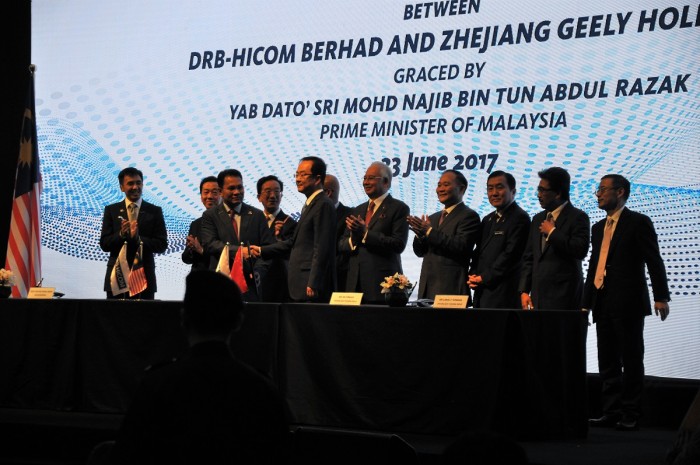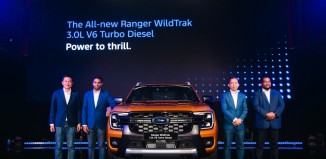The Geely – Proton Deal And What’s Possible
Last Friday, before the long weekend, DRB-Hicom Bhd (the owner of national carmaker, Proton) and Zhejiang Geely Holding Group Co Ltd sealed an agreement that will see the Chinese carmaker take a 49.9% stake in Proton for RM 460.3 million; DRB-Hicom will maintain majority shareholding in Proton. The RM 460.3 million will be made up of a RM 170.3 million capital injection and the Geely Boyue SUV platform (valued at RM 290 million).
In return, Proton’s non-automotive assets, including the land in Shah Alam, totaling some RM 1.2 billion will be transferred to DRB-Hicom and pledged to the government in exchange for its share conversion rights in Proton. This will see the eventual relocation of Proton’s corporate and remaining manufacturing operations from Shah Alam to its Tanjung Malim facility.
 The deal also includes Proton’s full disposal of British sports car maker, Lotus, for RM 556 million to Geely (51%) and Etika Automotive Sdn Bhd (49%; owned by Syed Mokhtar Al-Bukhary). This means the non-state-owned Chinese carmaker has another iconic European brand in its portfolio, apart from Volvo Cars and The London Taxi Company.
The deal also includes Proton’s full disposal of British sports car maker, Lotus, for RM 556 million to Geely (51%) and Etika Automotive Sdn Bhd (49%; owned by Syed Mokhtar Al-Bukhary). This means the non-state-owned Chinese carmaker has another iconic European brand in its portfolio, apart from Volvo Cars and The London Taxi Company.
 In his speech, Geely founder and chairman, Li Shufu, said that Geely is committed to reviving the fortunes of both Proton and Lotus, both of which have been operating at a loss for several years now. Proton will also serve as Geely’s right-hand drive production hub and will see its R&D facility incorporated as one of Geely’s global R&D centers for future development.
In his speech, Geely founder and chairman, Li Shufu, said that Geely is committed to reviving the fortunes of both Proton and Lotus, both of which have been operating at a loss for several years now. Proton will also serve as Geely’s right-hand drive production hub and will see its R&D facility incorporated as one of Geely’s global R&D centers for future development.
The signing ceremony also saw the reveal of the Boyue which will become Proton’s first-ever SUV, and most likely renamed. The show car was a left-hand drive model and it’s said that Geely is developing a right-hand drive version (its main focus has always been left-hand drive vehicles) but there won’t be a firm indication of production timeline, engine choices, exterior changes, localization, etc in the near future.
The Boyue in China comes with either a 2-liter engine or a 1.8-liter turbocharged direct injection engine (low- and high-pressure variants), and can have such features as 7″ digital instrument cluster, adaptive cruise control, Apple CarPlay, Android Auto, Hill Descent Control, Traction Control System, Tire Pressure Monitoring System, Lane Departure Warning, Crash Warning, smart high beam, and 360º 3D camera.
Will there be Geely models coming to Malaysia? This is a given as it makes more financial sense to gain better economies of scale, but a bigger likelihood is that they will be developed as right-hand-drive Proton models at the local R&D, using Geely platforms and powertrains, and exported as either brand depending on the market. Geely had in the past attempted to establish a production base in Malaysia with a local partner but the plan didn’t materialize.
Does this mean Proton is out of the woods? While Geely is seen as a sort of white knight, even its chairman has acknowledged that the marketplace has become more challenging. Geely itself too has to constantly innovate; its latest was the launch of Lynk & Co, a sub-brand that slots in between Volvo and Geely and offers cars on a sharing or subscription basis.
Even the acquisition of Volvo took some time to bear fruit. It had to continue with its legacy products as it took time to roll out new ones on new platforms and powertrains. But the wait has been worth it for Geely as the fruit is sweet. Last year, Volvo recorded a 6% and 66% jump in sales and operating profits respectively.
Meanwhile, The London Taxi Company, which makes the iconic black taxis is still looking for more solid financial footing, and they’re hoping the recent £300 million investment in a new manufacturing facility and range-extended electric taxi will fare well when the cabs are rolled out in 2019.
 As such, we may not see ‘improvements’ in Proton for the next few years as the company consolidates and streamlines its operations and product line-up. Bear in mind Geely is officially a substantial shareholder and it doesn’t have controlling stake like it does in Volvo Cars. And despite being wholly-owned, Geely practically let the professionals at Volvo manage the company (although Geely has board representation). And at the risk of sounding un-nationalistic or downplaying our local talent, Volvo has a long history of invention and innovation whereas Proton doesn’t. So we will have to wait for Proton and Geely to roll out the details on how Proton will be managed back to profitability.
As such, we may not see ‘improvements’ in Proton for the next few years as the company consolidates and streamlines its operations and product line-up. Bear in mind Geely is officially a substantial shareholder and it doesn’t have controlling stake like it does in Volvo Cars. And despite being wholly-owned, Geely practically let the professionals at Volvo manage the company (although Geely has board representation). And at the risk of sounding un-nationalistic or downplaying our local talent, Volvo has a long history of invention and innovation whereas Proton doesn’t. So we will have to wait for Proton and Geely to roll out the details on how Proton will be managed back to profitability.
Outside of Proton, its local vendors will have the opportunity to be a part of Geely’s supplier network. Will it be easy? No. But if they succeed as vetted suppliers, it will certainly open up a bigger market to them. In 2016, Geely sold 779,000 vehicles in China, and Volvo sold 534,000 globally.
As for including the Volvo Car Malaysia’s local assembly activities in Proton’s Tanjung Malim facility, DRB-Hicom Group MD, Datuk Sri Syed Faisal Albar, mentioned that it could happen if there is excess capacity at the plant. Volvo has been assembling cars in Malaysia for regional markets in its own facility in Shah Alam for the longest time and had recently upgraded that plant to assemble its new plug-in hybrid models. Volvo Cars as a whole operates with some degree of autonomy from Geely, even in China, so again we’ll have to see how the arrangements go since Proton isn’t wholly owned by Geely like Volvo is.




























